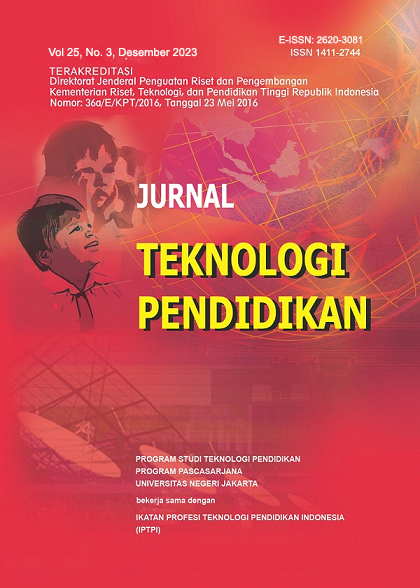College Students Expectation Toward Tutor in Distance Education
DOI:
https://doi.org/10.21009/jtp.v25i3.38869Keywords:
College Students Expectation, Distance Education, TutorAbstract
Teacher performance will affect students' endurance, motivation, and spirit during learning. Someone's competence to become a teacher/Tutor is no longer enough by only mastering teaching materials, especially for tutors whose role is more as a facilitator. The purpose of this research is to find out the expectations of college students toward tutors in distance education. This research is qualitative by using a survey method. The aspect measured used an instrument of the Likert scale and then analyzed by using descriptive statistics. Key findings highlight that students recognize the importance of tutors' skills and appreciate the benefits of guided tutorials. There is a notable expectation among students for tutors and the Universitas Terbuka (UT) units to collaborate effectively to enhance tutorial services, which are integral to the learning structure in distance education. The results indicate a positive correlation between the tutors' abilities and the provision of efficient and effective learning support. Students' understanding of tutors' skills, their perception of the benefits of guided tutorials, and their internal consistency in evaluating tutor performance during tutorials are collectively rated as 'good'. This reflects the tutors' successful efforts in assisting students to become independent learners who are self-motivated and actively engaged in the learning process. The study underscores the need for focused tutor training programs aimed at developing competencies that align with students' expectations and the demands of distance education.
References
Barokati, N., & Annas, F. (2013). Pengembangan Pembelajaran Berbasis Blanded Learning Pada Mata Kuliah Pemrograman Komputer. Jurnal Sistem Informasi, 4(5), 352–359.
Gamar, M. M., Al Faruq, M. S., & Lina, L. (2018). Challenging the Indonesian primary education in industrial revolution 4.0 era. 3rd International Conference on Educational Management and Administration (CoEMA 2018), 46–48.
Husaini, M. (2014). Utilization of Information Technology in Education Fields (E-Education)(In Indonesia Pemanfaatan Teknologi Informasi dalam Bidang Pendidikan (E-Education)). Jurnal Mikrotik, 2(1), 1–5.
Hussin, A. A. (2018). Education 4.0 made simple: Ideas for teaching. International Journal of Education and Literacy Studies, 6(3), 92–98.
Johnson, G. M., & Cooke, A. (2016). Self-regulation of learning and preference for written versus audio-recorded feedback by distance education students. Distance Education, 37(1), 107–120.
Kadarko, W. (2000). Kemampuan belajar mandiri dan faktor-faktor psikososial yang mempengaruhinya: Kasus Universitas Terbuka. Jurnal Pendidikan Terbuka Dan Jarak Jauh, 1(1), 18–28.
Kara, M., & Can, G. (2019). Master’s students’ perceptions and expectations of good tutors and advisors in distance education. International Review of Research in Open and Distributed Learning, 20(2).
Kurniawan, T. Y. D. W. I. (2014). Ekspektasi mahasiswa program studi pendidikan dokter reguler FK UGM fase kedua mengenai profil tutor ideal. Universitas Gadjah Mada.
Mulyasa, E. (2015). Menjadi guru profesional, menciptakan pembelajaran kreatif dan menyenangkan.
Orgaz, F., Moral, S., & Domínguez, C. M. (2018). Student’s Attitude and Perception with the Use of Technology in the University. Journal of Educational Psychology-Propositos y Representaciones, 6(2), 277–299.
Traxler, J. (2018). Distance learning—Predictions and possibilities. Education Sciences, 8(1), 35.
Downloads
Published
How to Cite
Issue
Section
License
Jurnal Teknologi Pendidikan is an Open Access Journal. The authors who publish the manuscript in Jurnal Teknologi Pendidikan agree to the following terms.
Attribution-ShareAlike 4.0 International (CC BY-SA 4.0)
-
Attribution — You must give appropriate credit, provide a link to the license, and indicate if changes were made. You may do so in any reasonable manner, but not in any way that suggests the licensor endorses you or your use.
-
ShareAlike — If you remix, transform, or build upon the material, you must distribute your contributions under the same license as the original.
- No additional restrictions — You may not apply legal terms or technological measures that legally restrict others from doing anything the license permits.
Notices:
- You do not have to comply with the license for elements of the material in the public domain or where your use is permitted by an applicable exception or limitation.
- No warranties are given. The license may not give you all of the permissions necessary for your intended use. For example, other rights such as publicity, privacy, or moral rights may limit how you use the material.








